
JOURNAL OF THE ENTOMOLOGICAL RESEARCH SOCIETY
Scope & Guideline
Unveiling the Secrets of Insect Life Through Research
Introduction
Aims and Scopes
- Taxonomy and Systematics:
The journal publishes research on the classification and identification of insect species, including descriptions of new species, updates to existing taxonomic groups, and faunal surveys. - Ecology and Behavior:
Research articles focus on the ecological roles of insects, their behaviors, interactions with other species, and their responses to environmental changes. - Insect Physiology and Morphometrics:
Studies examining the physiological aspects of insects, including morphometric analyses for species identification, adaptations to environments, and effects of various factors on insect biology. - Pest Management and Control:
The journal includes research on integrated pest management strategies, insecticide efficacy, and the impact of environmental factors on pest populations. - Conservation and Biodiversity:
Research addressing the conservation of insect species, biodiversity assessments, and the ecological significance of insects in various ecosystems.
Trending and Emerging
- Climate Change Impact on Insects:
An increasing number of studies are exploring how climate change affects insect distribution, behavior, and ecology, highlighting the urgency of understanding these impacts for conservation and pest management. - Use of Advanced Analytical Techniques:
There is a growing trend towards employing advanced methodologies such as molecular techniques, GIS, and machine learning for ecological studies and species identification. - Insect-Microbe Interactions:
Research into the role of gut symbionts and microbial communities in insect health and behavior is emerging as a significant area of interest, particularly in the context of pest management. - Integrated Pest Management (IPM) Strategies:
A notable increase in research focused on developing and evaluating integrated pest management strategies that combine biological, chemical, and cultural practices. - Conservation Genetics and Biodiversity:
Emerging themes include the application of genetic tools to assess and conserve insect biodiversity, as well as understanding the genetic diversity within populations.
Declining or Waning
- Traditional Chemical Pesticide Studies:
Research focusing solely on the toxicity of traditional chemical insecticides is becoming less common as the field shifts towards integrated pest management and eco-friendly alternatives. - General Insect Physiology:
While physiological studies remain important, there is a noted decline in general studies without specific applications or relevance to pest management or conservation. - Historical Taxonomic Studies:
There has been a reduction in purely historical taxonomic studies without new findings or implications for current biodiversity issues, as the focus shifts to contemporary ecological and conservation challenges.
Similar Journals
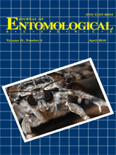
JOURNAL OF ENTOMOLOGICAL SCIENCE
Elevating Entomological Research to New HeightsJOURNAL OF ENTOMOLOGICAL SCIENCE, published by the Georgia Entomological Society Inc, is a crucial resource in the field of insect science and ecology. With a rich history since its inception in 1993, the journal provides a platform for innovative research and comprehensive reviews addressing various aspects of entomology. Although not an open-access journal, it is highly regarded within its community, holding a Q3 ranking in Agronomy and Crop Science, Ecology, Evolution, Behavior and Systematics, and Insect Science as of 2023. Each issue promises to contribute valuable insights to professionals, researchers, and students alike, making it an essential publication for those looking to stay abreast of developments in entomological studies. The journal's editorial commitment ensures that it remains at the forefront of entomological research through rigorous peer reviews and a dedication to scholarly excellence.

JOURNAL OF INSECT SCIENCE
Advancing Knowledge in Entomology and BeyondJOURNAL OF INSECT SCIENCE, published by OXFORD UNIV PRESS INC, stands as a pivotal platform in the field of insect science, offering open-access research since 2001. With an impactful presence in the academic community, this journal spans the convergence of entomology and various interdisciplinary studies, establishing itself in the Q2 quartile for both Insect Science and Medicine (miscellaneous) categories as of 2023. This esteemed journal is recognized for its contributions to the understanding and management of insect biology, ecology, and their implications for agriculture and human health, garnering a Scopus rank of 44 out of 181 in Agricultural and Biological Sciences. The Open Access model encourages wide dissemination of knowledge, making the rich repository of research accessible to a global audience. With ongoing publications until 2024, JOURNAL OF INSECT SCIENCE serves as an essential resource for researchers, professionals, and students seeking to deepen their understanding of the crucial role insects play in our ecosystem.
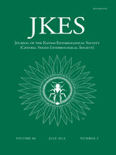
JOURNAL OF THE KANSAS ENTOMOLOGICAL SOCIETY
Fostering a Community of Entomological ExcellenceJOURNAL OF THE KANSAS ENTOMOLOGICAL SOCIETY, published by the Kansas Entomological Society, serves as a vital platform dedicated to the field of entomology and insect science. With an ISSN of 0022-8567 and an E-ISSN of 1937-2353, this journal has established itself since its inception in 1994, continuing to contribute valuable research up to 2024. Despite its current Q4 categorization in the 2023 Insect Science rankings, it ranks 106 out of 181 in Scopus, representing a significant opportunity for researchers to disseminate their findings in a supportive and engaged community. Although it is not an open-access journal, its commitment to rigorous peer review and relevance in agricultural and biological sciences makes it an essential resource for professionals, scholars, and students alike. The journal's focus on local and regional entomological issues often addresses broader ecological impacts, showcasing the importance of insects in environmental health and agriculture. We invite you to explore the rich tapestry of findings and discussions within this esteemed publication.
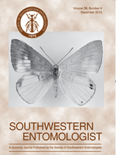
SOUTHWESTERN ENTOMOLOGIST
Fostering Collaboration in Insect Research and EcologySOUTHWESTERN ENTOMOLOGIST is a pivotal academic journal dedicated to advancing the fields of Agronomy, Ecology, and Insect Science. Published by the SOUTHWESTERN ENTOMOLOGICAL SOC in the United States, this journal plays a crucial role in disseminating vital research findings that address pressing ecological and agricultural challenges. With its ISSN 0147-1724 and E-ISSN 2162-2647, the journal has been publishing comprehensive studies since 1993 and continues to contribute significantly to the knowledge base up to 2024. As a Q4 ranked journal in both Agronomy and Crop Science and Ecology, as well as Insect Science, it provides an inclusive platform for researchers and students to share their insights and foster collaborations. Although it currently does not offer open access options, the content is accessible to academic institutions and professionals, ensuring that significant findings reach a broad audience. Given its niche focus, SOUTHWESTERN ENTOMOLOGIST not only appeals to researchers and students but also to professionals looking to stay updated on the latest trends and developments in entomology and its related fields.
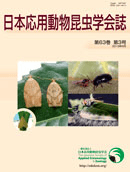
JAPANESE JOURNAL OF APPLIED ENTOMOLOGY AND ZOOLOGY
Diving Deep into the World of Insects and BiodiversityJapanese Journal of Applied Entomology and Zoology is a premier publication in the field of Insect Science, offering a platform for researchers and practitioners to share their findings on applied entomology and zoology. Established in 1957 and published by the Japan Society of Applied Entomology and Zoology, this journal aims to foster the understanding of insect-related studies that impact agriculture, ecology, and biodiversity. With an ISSN of 0021-4914 and E-ISSN of 1347-6068, it serves as a crucial resource for both academics and industry professionals. While the journal currently resides in the Q4 category of the Scopus ranking for Insect Science with a percentile of 11th, it plays a significant role in providing valuable insights into insect behavior, systematics, and their ecological roles. Readers can benefit from its published research to drive innovations and solutions in pest management and conservation practices. As the journal continues to evolve, it reinforces its commitment to disseminating critical research that supports sustainable practices in entomology and zoology through its convergence extending to the year 2024.
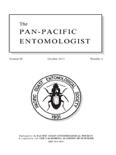
PAN-PACIFIC ENTOMOLOGIST
Championing Insect Research for a Sustainable FuturePAN-PACIFIC ENTOMOLOGIST, published by the PACIFIC COAST ENTOMOLOGICAL SOCIETY, serves as a pivotal platform for disseminating research in the field of entomology, encompassing a variety of topics related to insects and their interactions within ecosystems. Operating under the ISSN 0031-0603 and E-ISSN 2162-0237, this esteemed journal has been committed to advancing our understanding of insect science since its initial publication in 1993, with coverage extending to 2024. Notably categorized in the Q4 quartile of the insect science category and ranked in the 5th percentile of Scopus, PAN-PACIFIC ENTOMOLOGIST offers a unique opportunity for scholars, professionals, and students to engage with cutting-edge research and contribute to the scientific dialogue within this specialized field. While currently not open access, the journal is dedicated to the dissemination of empirical studies, reviews, and short communications that elucidate the crucial roles insects play in agriculture, ecology, and public health. Situated in the heart of San Francisco, California, this journal not only enriches the academic community but also promotes a deeper appreciation for the diverse and often under-appreciated world of entomology.

REVISTA DE LA SOCIEDAD ENTOMOLOGICA ARGENTINA
Driving Discourse in Entomology and Environmental ScienceREVISTA DE LA SOCIEDAD ENTOMOLOGICA ARGENTINA is an esteemed open-access journal dedicated to the field of entomology, published by the SOCIEDAD ENTOMOLOGICA ARGENTINA. Since its transition to open access in 2013, the journal has sought to promote research in insect science, ecology, and related disciplines, facilitating global dissemination of knowledge and encouraging collaborative studies across borders. Located in the vibrant scientific landscape of La Plata, Argentina, the journal is indexed in Scopus and categorized in the fourth quartile of ecology and insect science, reflecting its commitment to enhancing the discourse within these critical fields. Aiming to bridge the gap between researchers, students, and professionals, REVISTA DE LA SOCIEDAD ENTOMOLOGICA ARGENTINA serves as a platform for innovative research, reviews, and reports on ecological interactions, behavior, and systematic entomology, ultimately driving forward our understanding of insect biodiversity and its broader environmental impacts.
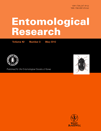
ENTOMOLOGICAL RESEARCH
Unraveling the Mysteries of EntomologyENTOMOLOGICAL RESEARCH, published by Wiley, is a prominent journal within the field of Insect Science, with a significant focus on advancing our understanding of entomological studies, including pest management, biodiversity, and ecological impacts of insects. Since its inception in 2007, the journal has served as a vital platform for researchers and practitioners to publish high-quality, peer-reviewed articles that contribute to the growing body of knowledge in this essential discipline. With an H-index illustrating its citation impact and its classification in the 2023 Scopus quartile rankings at Q3, ENTOMOLOGICAL RESEARCH ranks 69 out of 181 journals in its field, positioning itself within the 62nd percentile, which underscores its relevance and contribution to agricultural and biological sciences. Although it does not offer Open Access, the journal remains committed to ensuring that its content reaches the widest possible audience, supporting ongoing discoveries and innovations in insect science. For researchers, professionals, and students seeking to remain at the forefront of entomological advancements, ENTOMOLOGICAL RESEARCH is an indispensable resource.

TURKIYE ENTOMOLOJI DERGISI-TURKISH JOURNAL OF ENTOMOLOGY
Fostering Knowledge in the Fascinating Realm of EntomologyTURKIYE ENTOMOLOJI DERGISI - TURKISH JOURNAL OF ENTOMOLOGY is a distinguished journal published by the Entomological Society of Turkey in collaboration with Ege University, dedicated to advancing the field of insect sciences. With an ISSN of 1010-6960 and E-ISSN 2536-491X, this journal plays a pivotal role in disseminating groundbreaking research in entomology, particularly focusing on the diverse aspects of insect biology, ecology, and their applications in agriculture. As a member of the Q3 category in Insect Science according to the 2023 quartiles, it ranks in the 40th percentile of its field, indicating its growing influence and importance within the scientific community. The journal's scope encompasses innovative research findings, reviews, and short communications that contribute to the understanding and management of insect species. While not currently open access, it serves as a vital resource for researchers, professionals, and students seeking to stay informed about the latest developments in entomology from Turkey and beyond, with a commitment to maintaining high scholarly standards through rigorous peer review processes.
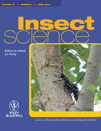
Insect Science
Advancing the understanding of insect dynamics in ecosystems.Insect Science, published by WILEY, stands as a prestigious journal in the realms of Agronomy, Biochemistry, Genetics, and Insect Ecology. The journal, with ISSN 1672-9609 and E-ISSN 1744-7917, has firmly established itself as a significant resource for researchers and professionals seeking to explore the intricate dynamics of insects and their crucial roles in ecosystems. With a remarkable impact factor placing it in the Q1 quartile across multiple categories, including Ecology and Evolution and Agronomy and Crop Science, Insect Science ranks impressively at #8 out of 181 in the realm of Insect Science on Scopus, showcasing its influence and relevance in the field. Spanning its coverage from 1994 to 2024, this journal invites contributions that advance our understanding of insect biology, behavior, and their interactions within agricultural contexts. The commitment to high-quality research and its role in fostering interdisciplinary dialogue make Insect Science an essential platform for scholars and practitioners at the forefront of insect-related studies.